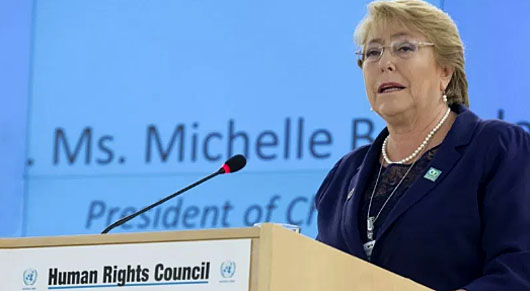Special to WorldTribune.com
UNITED NATIONS — In a stunningly stark report on the political and economic conditions in Venezuela, the UN’s Human Rights chief Michelle Bachelet, outlined a troubling litany of continuing human rights abuses, extrajudicial killings, and economic privations characterizing the besieged Latin American country.
The groundbreaking report by the Office of the High Commissioner for Human Rights, a UN human rights team visited Venezuela and conducted over 500 interviews from President Nicolas Maduro to civil and political figures in the democratic opposition such as interim President Juan Guaido. The conclusions were deeply troubling.

According to the UN, “while previous reports have highlighted arbitrary detentions, ill-treatment and torture.” The latest publication warns that “if the situation does not improve, the unprecedented outflow of Venezuelan migrants and refugees will continue, and the living conditions of those who remain will worsen.”
The UN High Commissioner for Refugees (UNHCR) stated that some four million people are believed to have fled the country in the last four years, largely due to food and health care shortages. That’s from a population of thirty million! Venezuelan refugees are pouring into neighboring Colombia and equally going to Peru, Argentina and Ecuador.
Ms. Bachelet, a former President of Chile stated, “During my visit to Venezuela, I was able to hear the first-hand account of victims of State violence and their demands for justice.”
The sixteen page document, delivered during Human Rights Council deliberations in Geneva, outlines how State institutions have been “steadily militarized” over the past decade and adds that civil and military forces have been “allegedly responsible for arbitrary detentions, ill- treatment and torture,” of government critics. It adds, “Successive laws and reforms have facilitated the criminalization of the opposition and of anyone critical of the Government.”
Consider the record. Until the end of May this year, 66 people were killed during anti-government protests and another 793 remained in arbitrary detention. Allegations of extrajudicial killings by regime “Special Action Forces” have been “shockingly high.”
In 2018, the government registered 5,287 killings purportedly for “resistance to authority.”
Between January and 19 May this year, another 1,569 people were killed according to the Caracas government. The most recent case involves the death of retired Navy Captain Rafael Acosta Arévalo who died in government detention after torture.
Regarding the plight of ordinary Venezuelans to get food the report advises, “large sections of the population have no access to food distribution.” Women are particularly hard hit “amid a progressive scarcity and un-affordability of food.” Health care is “dire, with hospitals lacking staff, medicines and electricity.”
Ironically today’s food shortages and poor health care are mirror opposites of what middle class Venezuela experienced until the steady privations of Hugo Chavez and his successor Nicolas Maduro’s socialist rule. Venezuela’s oil rich economy and democratic political system had secured a middle class life for most citizens until into the early years of Chavez’s rule. Corruption, hyper inflation and now endemic shortages define a once prosperous country.
Escaped Venezuelan MP Miguel Pizarro addressed the Human Rights Council and pleaded for his persecuted countrymen. “According to figures published by the United Nations itself, seven million Venezuelans today need humanitarian aid. More than four million have migrated because of the humanitarian emergency, and at least 630 political prisoners have been documented.”
Mr. Pizarro went into hiding after the Maduro regime accused him and other lawmakers of “treason” and stripped them of parliamentary immunity. The European Union later called the Venezuelan action “part of a pattern of blatant violations of due process,” amounting to “clear measures of intimidation.”
Hillel Neuer, Executive Director of UN Watch who invited MP Pizarro to the hearings added, “Sadly despite our repeated appeals, the UN Human Rights Council has refused to establish a commission of inquiry to hold Maduro to account for gross and widespread violations that many experts believe amount to war crimes.”
Cuban security police and military advisors remain Maduro’s enforcers and act as a check upon his own military.
Interim president Juan Guaido, despite his democratic credentials, is still barred from office.
Nonetheless, most Latin American countries, the European Union, the USA and Canada have diplomatically recognized him as the legitimate government.
In another bid to defuse the dangerous political impasse, Juan Guaido will enter into talks with representatives of the Maduro dictatorship on the Caribbean island of Barbados to seek a “constitutional solution” to the percolating political crisis.
Venezuela’s cruel misadventure continues as the malevolent Maduro regime turns the once prosperous Latin American land into a socialist dystopia corkscrewing into free fall. Can Venezuela somehow be saved?
John J. Metzler is a United Nations correspondent covering diplomatic and defense issues. He is the author of Divided Dynamism the Diplomacy of Separated Nations: Germany, Korea, China (2014). [See pre-2011 Archives]

 By
By